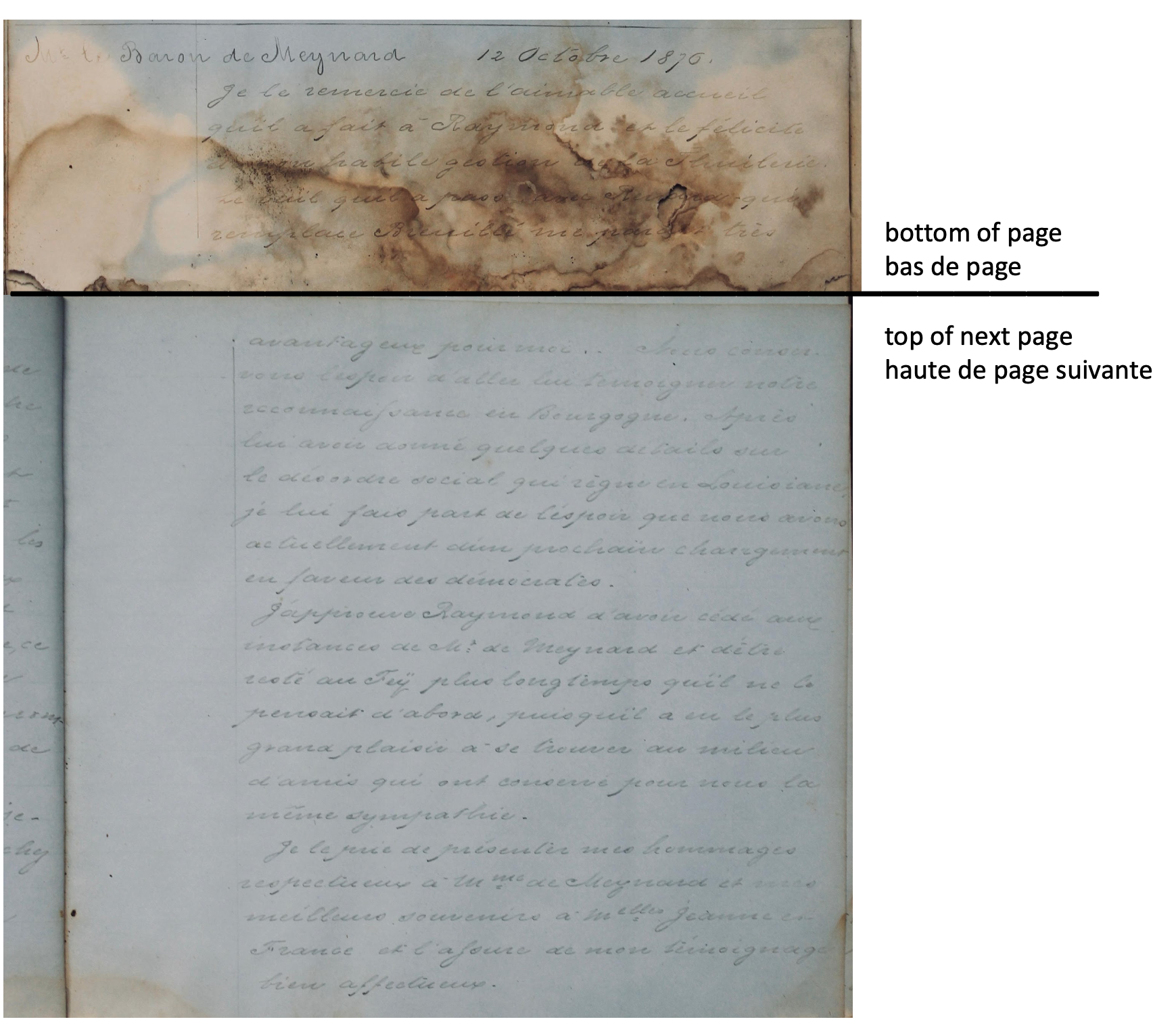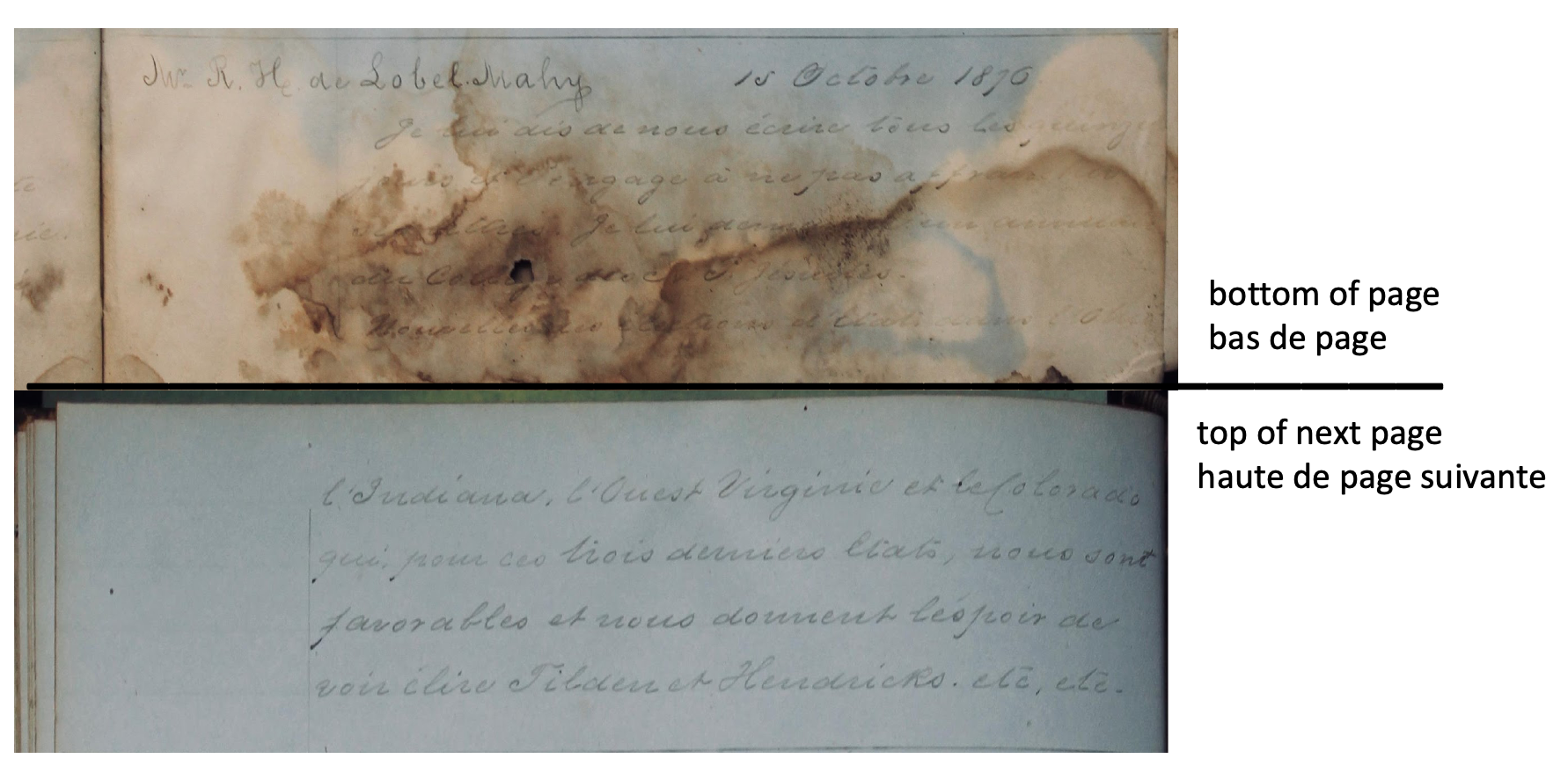Posted by Joseph on April 03, 2023

In this episode, Katy and Joseph chat about "the de Lobel-Mahy notebook," the challenges of working with damaged historic documents, and talk about how these small excerpts from private correspondence can provide deep insights into family life in Louisiana and France, as well as the social and political climate of the time period.
As promised, we've included images of the pages below so our listeners can see condition of the document. Translations into English follow.
Excerpt 1

Mr le Baron de Meynard
Octobre 12, 1876
I thank him for the kind welcome he gave Raymond and congratulate him for his skillful management of la Thuilerie. The lease that he negotiated with Rensard (sp?) replacing Breuillé appears advantageous for me. We still hope to travel to Bourgogne to show him our appreciation. After assuring him of several details about the social disorder that reigns in Louisiana, I share with him our present hope of a coming change in favour of the Democrats [then the conservative, segregationist party in Louisiana].
I agree with Raymond's decision to acquiesce to Mr Meynard's insistence that he remain longer at Feÿ than he initially thought he would, since he had the great pleasure to be among friends who have retained the same feelings for us. I request that he communicate my respectful compliments to Mme de Meynard and our fondest memories to Mesdemoiselles Jeanne and France and send him friendly greetings.
_________________________________________________________________________________________________________________________
Excerpt 2

Mr R.H. de Lobel-Mahy
October 15, 1876
I urge him to write to us every 15 days and urge him to not spare any details in his letters. I ask him for a directory of the school of the Jesuit Reverend Fathers. News of the elections in the States of Ohio, Indiana, West Virginia and Colorado, in the case of the last three States are favorable to us and give us the hope to elect Tilden and Hendricks, etc. etc.
Posted by Joseph on March 29, 2023

In this episode, we compare and contrast the lives of Creoles on the plantation in the countryside and in their French Quarter mansions in New Orleans. We talk about the Locouls' Toulouse Street mansion, its significance as a status symbol, and some of the experiences Laura would have had in her grandmother's home. We also explore the impact of the Civil War, the diversity of the neighborhood, and the illegal activities surrounding the home.
Posted by Joseph on March 22, 2023

Sand Marmillion, Director and Curator of Laura Plantation, joins us to share the stories of two very significant enslaved women who lived and worked at Laura Plantation. Clarisse Peterson, an American slave who arrived on the plantation in adulthood and was in charge of tending to the sick and injured in the plantation hospital, and Clarisse Wilson, a Creole, born into slavery at Laura Plantation, who was involved in the founding of the Baptist Church, took in orphans, and acted as a mother figure in the community. We also touch upon the lives of their husbands, one of whom they shared (not simultaneously)! We compare and contrast their lives, note the changes that took place after the Civil War, and learn about one of their descendants, Freddie Keppard, a famous New Orleans jazz pioneer.
#lauraplantation #womenshistory #womenshistorymonth #jazzhistory #jazz
Posted by Joseph on March 15, 2023

In this episode we discuss the educational opportunities available to Creole women--both free and enslaved--and the way they evolved over time. These include convents, governesses, private schools, and public schools. Religion and language were key elements in the instruction of Creole women in the colonial and antebellum eras, but after the Civil War this would change. Formerly enslaved children and adults learned to read and write at schools established by the Freedmen's Bureau after the Civil War. With the end of Reconstruction, many of those educational opportunities came to an end. Not until 1952 did Black children growing up on Laura Plantation have access to a high school.
Posted by Joseph on March 07, 2023

Laura Plantation was owned and operated by women at various times spanning four generations. Nanette Duparc took over after her husband’s death and established the business. Her daughter Elisabeth Locoul inherited the plantation during the Civil War and ran it until she donated the property to her children. After Emile Locoul’s death, his wife Desirée and their daughter Laura were instrumental in making decisions about the management of the plantation. How was this possible?
Louisiana’s legal system enabled Creole women to maintain a certain amount of autonomy after marriage. This episode explores the differences between Louisiana's legal system, based on civil law, and that present in the rest of the nation, based on common law, and the impact this had upon women.









